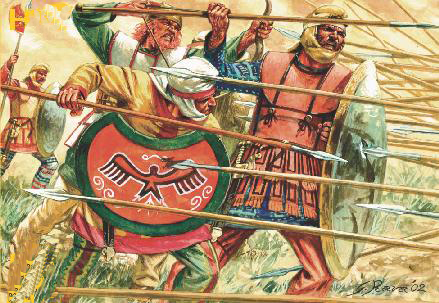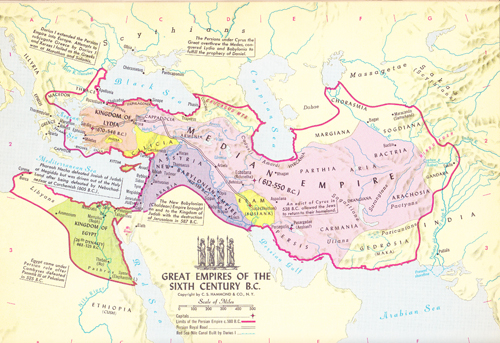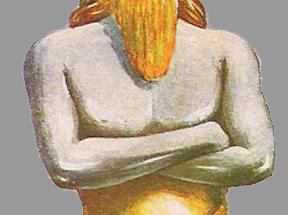Act 3, Scene 3:
PERSIA
Chest and Arms of Silver
“And behold another beast, a second, like to a bear, and it raised up itself on one side, and it had three ribs in the mouth of it between the teeth of it: and they said thus unto it, Arise, devour much flesh.” Dan. 7:5
The fall of the Babylonian Empire and the subsequent ascension of the Median-Persian Empire to the throne of the Antichrist is the first step in the evolution of the Beast, an evolution viewed in the Book of Daniel from two distinctly different perspectives. The first view shows how the piecing together of the Colossus of Empire is a systematic joining together of one part to another part, until Satan's imitation body of Christ is fully joined into a mature being, complete with a body, soul and spirit, and equipped with capabilities to march through the whole earth. The second view tracks the metamorphosis of the Beast starting as a regal lion and finally growing into an indescribably horrible beast endowed with the power and disposition to ruthlessly crush the entire earth into submission. From either perspective, Persia's conquest of Babylon in 538 B.C. marks the beginning of the maturing process of the Antichrist Empire.
"The Redemption Play's" next scene, therefore, opens in the year 538 B.C. with the Median-Persian Empire preparing to play its role in God's quintessential history as the new and proud owner of the Antichrist scepter. The Median Potentate, Darius, has just defeated the Babylonian army, but the Babylonians, with many years worth of stores stockpiled in the city, have retreated behind Babylon's unassailable walls. There, the overconfident Babylonians smugly jeer at the angry hordes of Median horsemen and Persian charioteers who camp frustrated outside the fabled city's huge brass gates. Babylon's arrogance is to be short-lived however; God's prophecy will not wait to be fulfilled. One Antichrist beast is about to devour another and incorporate it into its Antichrist nature making it fuller, more mature.
Outside the city walls the Median-Persian army works to divert the Euphrates River into reservoirs and soon the river bed leading under an open water gate is dried up. With the way clear the hostile army enters the city at night undetected. Once inside it is an easy matter for the well trained troops to overcome the flabby, unsuspecting Babylonian population. As Daniel reported, the people and nobles of the city were partying and dancing when sudden destruction tumbled down on their golden kingdom.
It must have been tremendously gratifying for Daniel to personally witness the fall of Babylon since it was something his prophecies had specifically promised. Daniel's prophesied Median-Persian conquest of Babylon coming during his own lifetime must have had a reassuring affect on him that the growth of this Beast, as terrible as it looked, was a process of continuing judgment which would be brought along in God's time under his skillful direction. Chapter 5 of Daniel records the moment that Persia, the chest and arms of the Empire, conquered Babylon, thereby "joining" itself to the head of gold.
The Body is Joined to the Head
Belshazzar, Nebuchadnezzar's grandson, had ascended to the throne of Babylon. Belshazzar presumed himself to be secure and all powerful, but on the evening of his doom, during a great feast (a feast he was holding in his own honor), Babylon the Great fell and he was slain. As his grandfather before him, this arrogant Belshazzar was destined to be an example of the Antichrist's fate. Belshazzar mocked God by defiling the sacred vessels - the same vessels Nebuchadnezzar had taken from God's Temple during the sack of Jerusalem - using them to drink to the gods of gold, silver, brass, iron, wood, and stone - notice these are the symbols of the Antichrist Empires - and by doing so Belshazzar had committed the final blasphemy. While he lounged in decadence, eating and drinking, a "bear" stood at the door ready to devour him and his world and he never knew what was about to hit him. According to prophecy Persia had been prepared by God to be Belshazzar and Babylon's judge and swift executioner. The invading hordes ransacked the city, pillaged the palace, executed the king, and became the rulers of Babylon and the world, all in one night!
The Persian Empire Took Control of the
'Meat and Potatoes' of Everyday Life

Persia, as the body and arms of the Colossus, provided form and substance to the soul which Babylon had already created for the Beast. Persia tightened its rein on people by centralizing the government and introducing the world to the original "Big brother is watching you" order. There was no surveillance equipment, no television, no telephones, no telegraphs, travel and knowledge had not grown to the extent it would in the last days, but the Persians developed a sophisticated means of control through a well oiled chain of provincial governments that led back to the Empire's Capital, Persepolis. A system of satraps (governors), closely regulated provinces (states), with organized taxation and census taking, fully bureaucratized, was rigidly adhered to throughout the kingdom and finely tuned over the next two centuries of Persian domination. This network of provinces gave the empire a hold over economic life and provided a workable system of control in naturally hostile lands enabling Persia's omnipotent ruler to keep a death grip on the laws, religion, and politics of the natives in even the most remote territories. Every aspect of village and hamlet life was under the watchful eye of the "Bear". The silver arms of Persia had sprouted the hands necessary for keeping a firm grip on its provinces. Babylon had instituted a religion well suited for the Antichrist's purpose and had devised a scheme that would make the world submit to it. Persia now provided the Empire with the means to control the "meat and potatoes" of everyday life.

click to enlarge map
In his dream of Chapter 8, Daniel saw the Persian empire push to the south, to the north, and to the west, - Map 5 pictures the fulfillment of this prophecy - and Persia certainly expanded the Empire's domain in those three directions. Satisfying its gluttonous appetite for conquest with vicious and brutal methods of terrorism, the devouring bear of Persia munched up everything and everybody in its path. Daniel's vision of the bear standing upright with three ribs in its mouth being told, "Arise, devour much flesh!", is a hard-hitting picture of the bloodthirsty, repressive nature of the Median-Persian spirit of Empire. Like any wild beast which gets a taste of blood the Antichrist Beast would be, from now on and throughout the rest of history, a man-eater. At the time of the Iranian-U.S. hostage affair in the late 1970’s there was a stir in the world over the Iranian (Persian) government's repressive, tortuous methods of control. The reports of torture and death shocked some, but they are not at all out of character for the spirit of the Persian Empire, or the spirit of the Antichrist in general. The cruelty of Persia is legendary. The devouring, cruel, abominable, ruthless and satanic methods of Persia became an inherent part of the Empire forever. Tales and stories of Persian cruelty and unthinkable tortures pollute history books everywhere and are too troubling even to tell, but an example out of Daniel's own experience will give a clear testimony as to the brutality of the methods which Persia injected wholeheartedly into the Beast.
Daniel and the Lion's Den
The omnipotent king of Persia - influenced by the flatteries of his close counselors, who were also conniving enemies of Daniel - decreed that for a period of 30 days no man should make petition to any god, but him. (A decree with prophetic overtones foreboding the imposed restrictions of the Antichrist at the end when no one can buy or sell without being fully subjected to him.) Any offender was to be thrown, without appeal, into a den of hungry lions. No man was allowed to seek his God in prayer or in worship; the king was to be relied upon and worshiped exclusively, as if he were the one true Savior. Once again, the conspiracy of Antichrist religion to wrest worship away from God was surfacing.
This outrageous decree had a dual purpose, however. Knowing Daniel would continue to pray and worship before the Lord no matter what the consequences might be, Daniel's enemies concocted the plan with the specific purpose in mind of destroying the prophet. The first part of the plan went as expected. Daniel, even though he remained a trustworthy servant of the government, one who had won the great admiration and respect of the king, continued to pray to his God in spite of the threat to his life. The conspirators laid in waiting, ready to pounce on their first chance to catch Daniel on his knees in prayer. It did not take long before the dastardly conspirators had the opportunity to gleefully turn Daniel in to the king to be torn to shreds by the waiting lions. The king's heart sank and he immediately regretted signing the decree into law, but he had painted himself into a corner. Given no choice but to back his own decree or undermine his authority, the king labored in vain all day and all night to find a loophole that would allow him to circumvent his own command, but in the end there was nothing the powerful ruler could do to help his servant. Helpless, this supposedly omnipotent ruler was forced to condemn his faithful servant to death. Reluctantly, the king pronounced sentence and allowed Daniel to be shut up in the hungry lion's den. As a last resort even the king was forced to break his own law. Turning to God for hope, the king made a petition of his own and encouraged Daniel that everything would be all right, saying, "Thy God whom thou servest continually, he will deliver thee." For the king – of whom it might be said that he was trying on the shoes of deity for a limited trial period - it was a huge admission to say God could deliver Daniel when he, the King, could not. Again, in spite of the pretensions of the Beast and its ruler, God had forced the pretender to relinquish his claim.
On the next morning, when the guards rolled away the stone from in front of the den the king's promise that God would save Daniel was proven correct. As with the three Jews in Babylon, God had saved Daniel, the man of faith, from death. The king was so pleased that he bestowed further honors and position on Daniel and as in the case of Meshach, Shadrach and Abednego, the tables of justice were turned on the band of conspirators when the king ordered them cast to the waiting lions, and to the fate they thought had been so carefully contrived for God's prophet.
The Beast and Its Hatred for the Jews
The well organized bureaucratic system managed from a central point and anchored by a ruthless oppression of liberty is the major contribution Persia made to the evolution of the Empire. No person was born, or died, or made money, or got married, without the government's desire to know and record it. Persia gave the Empire body. And in that lies Persia's crucial and important contribution to God's quintessential history.
But there is one more thing. Persia holds the notorious distinction of introducing a particular evil into the Beast's character that would be at the very heart of the conflict with the nations and their competition in the centuries to come. Hatred of the Jews.
Satan Always attempts Genocide
Prior to Israel's Possession of the Promised Land
Persia injected the Beast with the virus of senseless, unrestrained hatred of the Jews. Down through history this hatred has been wanton, often it has been motivated by jealousy, sometimes the Jews have been political pawns used as scapegoats to cure the world's ills. Just prior to World War II an author warning the Jews about the coming conflagration predicted the Jews would become victims in the battle between the nations once again, writing, “the wheels of progress in the world have always been greased with Jewish blood.” No one alive today has to be told how perfectly accurate that statement was and is. Many times, not just in World II, their persecution has swelled to a fever pitch; imprisonment, violence and killing followed. The Jews have been the world's whipping boy; any excuse, any accusation, any suspicion serves as reason enough to attack them. On occasion the persecution has grown to its ultimate, as in the case of Persia when it manifested itself in the worst of possible ways with the attempted genocide of the entire Jewish people. Genocide of the Jews was not new to history, Satan's first plot to exterminate the Jews came with Pharaoh's attempt to slaughter all of Israel at the Red Sea; and it was quickly tried again during the Jews subsequent wanderings in the desert when Balak tried to coerce God into cursing Israel hoping God would become impatient with their idolatry and destroy them out of frustration. It is no coincidence that these genocidal plots against the Chosen Nation came as she was moving toward the Promised Land to take possession of it. These original schemes of genocide set an historical precedent that would reappear like clockwork at two very crucial points during the "The Redemption Play". Both times, just prior to Israel's return to the Promised Land, Satan's Antichrist plot to exterminate the Jew resurfaced. The common denominator in genocide is that it precedes the return of the Jews to the land.
There have been three times in history when God was moving the Jews to possess the land: in 1400 B.C. when Moses led Israel out of Egypt; in 426 B.C. when it was time for their return after 70 years of captivity in Babylon; and in A.D. 1948 upon their return for the final days after World War II. Each time, when God has readied his people to take the land, there has been a satanic conspiracy to exterminate them, but each time God has foiled the plan, and in fact, used Satan's own plan to facilitate the return of his people to Israel.
Persia Attempts Genocide
Just before Return from Babylonian Captivity
The second conspiracy of genocide and the subsequent return of Israel to the Promised Land came at the very beginning of the Persian reign and is recorded in the wonderful, wonderful Book of Esther. Prophecy was being miraculously fulfilled at this time. The words of Daniel were coming to pass, the Jews were authorized to return to Jerusalem, the walls of the city were being restored, and the Temple of God was about to be rebuilt. This is the time of Nehemiah and Ezra; the fulfillment of the returned captivity of the 70 years in Babylon prophesied by Jeremiah and confirmed in Daniel (chapter 9); and the enemy was in a fury to avert the return of the Jew to the Promised Land.
The thrust of the Book of Esther is about the high prince of Persia named Haman, and his personal satanically inspired mission to wipe all Jews from the face of the earth, and how God used two Jews and King Ahasuerus of Persia, to confound Haman and his genocidal conspiracy.
The trouble started when Mordecai, a faithful Jew, refused to bow to Haman as the Persian nobleman passed before him on his daily trip to the palace. As a Jew, it was not right for Mordecai to give any man such worship, but Haman's pride and anger grew each day as Mordecai continued to refuse to bow before him. Egged on by Satan, Haman devised his antichrist plot. By bribery and flatteries, Haman weaseled his way into the favor of the king, where he immediately convinced him that the Jews were the mortal enemies of the state, a threat to the king's authority, and a menace to order throughout the empire. The king, under Haman's instigation, agreed to set a special day and hour when all Jews would be eliminated. King Ahasuerus announced the date for the general extermination and it was posted in every community and province throughout the Empire. Haman, licking his chops, went immediately home and built a special gallows in his courtyard on which to personally hang his hated enemy, Mordecai.
The Jews and Mordecai seemed doomed. But God had made a way to deliver his people. Shortly before Haman's plot, the Lord had touched the king's heart to elevate Mordecai's adopted daughter, Esther, to First Queen of the Kingdom. Hoping Esther's influence could make a difference, Mordecai asked Esther (who did not know she was a Jew until Mordecai informed her) to intercede in behalf of Israel to the king (who also was unaware that Esther was a Jew). To do so however, was a very risky business, even for the First Queen. And not just because she was a Jew, but because Persian Law demanded that anyone daring to enter the presence the king without first being summoned was to be put to death. Under the law the only reprieve came if the king raised his scepter to receive the uninvited subject. Esther was forced, however, to take the chance because the date for the Jews extermination was drawing perilously near. If the Jews were to be spared Esther would have to act at once. Bold in faith, Esther put her life on the line and interceded for her people the next day. As she entered the king's presence his heart was so touched and he was so overcome with love for her that he not only lifted up his scepter to receive her, but he promised to give her any thing - anything she requested - even half of his kingdom.
Esther did not act brashly, but, being lead by the Spirit, merely requested that the king and Haman come to a special banquet, saying only that she would make known her desire there. The king, accompanied by the evil Haman, came that night as requested, but again Esther delayed her request asking them both to return as her special quests the following night. Again the king happily consented. In the interim God's supernatural plan began to unfold and, just as with the conspirators who thought to throw Daniel to the lions, the tables were about to turn on Haman.
The turn of events began with one of God's “coincidences". After the king returned home from the first banquet he found himself unable to sleep and asked to have some of his records read to him. In the reading it was accidentally discovered that a man named Mordecai had uncovered a plot to assassinate him some years earlier. The king was disturbed to find that nothing had ever been done to thank Mordecai for saving his life and decided to honor him without delay, that very next morning. Seeking counsel, the king called, of all people, Haman, and posed this simple question to him, "What should I do to a person I want to honor?". Haman, with predictable conceit, thought the king meant to honor him. Presumptuously, Haman advised the king to clothe the man in the clothes of the king, put him on the king's horse, crown him with a crown, and have him led through the streets by one of the king's high princes, who should proclaim as he went, "Thus shall it be done to the man whom the king delighteth to honor!" Imagine Haman's horror when he learned the man to be honored was the man he had conspired to hang. To make it even more horrific, Haman was chosen to lead Mordecai through the streets, forced to publicly declare the honor of the man he wanted to kill. And the worst was yet to come!
After suffering so great a humiliation Haman still had to attend the banquet that night. At the banquet Esther dropped the big bomb, asking not for half the kingdom, but for the lives of her people, and the judgment of Haman and his house. The king's heart was turned instantly against the weasel, Haman. As the king stepped outside the banquet hall to consider the fate of his high prince, Haman fell on Esther's bed where she was reclining, appealing to her mercy. The king entered to see this and was infuriated further, lasting Haman for daring to force himself on the queen even in his presence. Just then one of the king's guards told the king that Haman had erected a huge gallows at his own home where he had planned to hang Mordecai, whom the king had just honored that morning. Without hesitation the king barked, "Hang him on it!"
Granting Esther's request, the king promptly turned his previous proclamation around granting the Jews special status in the empire and licensing the slaughter of those who had made preparations to slaughter them. More than 75,000 conspirators were slain that day.
Haman was hung on the gallows he had built for Mordecai and his ten sons were executed. Instead of wiping out the seed of Abraham, Haman's seed was lost forever. Esther was strengthened as First Queen; Mordecai was given the position, home, lands and all the wealth, of the dark prince Haman. Mordecai had been given what Haman had schemed to own, and Haman had gotten in full the judgment he had conspired for Mordecai and the Jews. God loves irony in his judgment. He loves to give evil conspirators the very thing they conspire to do; as a favorite message of the Bible preaches, you reap what you sew.
Still, Satan will not let up; though he is powerless to prevent the wonderful irony of God's judgments. The story of Esther is a recurring one in history: the attempt by Satan and his Antichrist to exterminate the Jew before he can return to the Promised Land. Pharaoh and Balak tried it and were destroyed, Haman tried it and was destroyed, and Hitler tried it and was destroyed. This attempted genocide is a fulfillment of the prophecies of Moses, of the prophets, of Jesus, and of the Epistles: that the Jews would be scattered, hated, and killed for the sake of the Gentile world and for the salvation plan of God. This hatred of the Jew explodes in Satanic fury whenever the seed of Israel is about to occupy the Promised Land. And it is during the time of Persia that the Antichrist Empire is infected with the virus of genocide.


